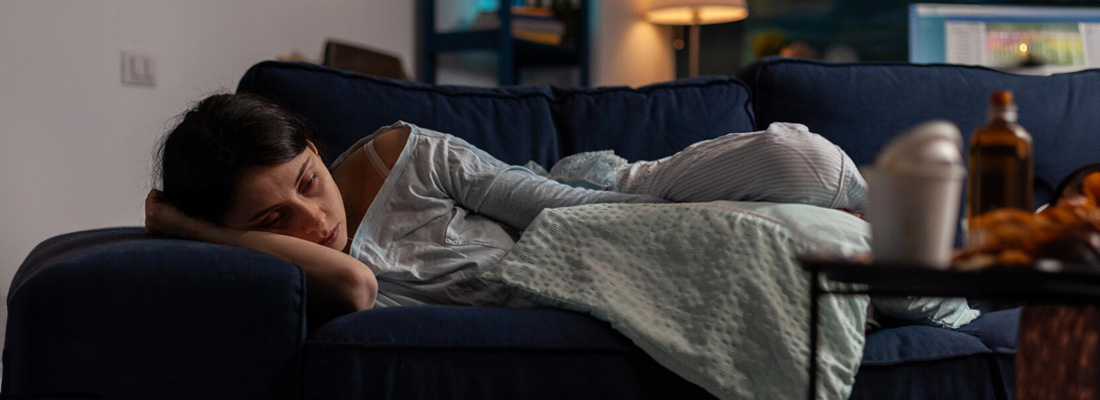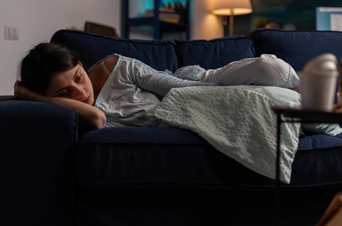
Do you ever crawl into bed feeling exhausted, only to find your mind wide awake the moment your head hits the pillow? Maybe you fall asleep easily in places other than your bed or struggle to resist napping during the day. Furthermore, does your sleep quality dictate your mood, and do you find yourself constantly talking about how you slept the night before?
If this sounds familiar, you could be experiencing psychophysiological insomnia. This type of insomnia is characterized by difficulty falling asleep or staying asleep due to heightened anxiety about sleep itself.
Therefore, read ahead and find out more about psychophysiological insomnia and explore effective treatments to achieve restful sleep.
What is Psychophysiological Insomnia?
It is described as a pattern in chronic insomnia where anxiety about sleep itself disrupts your ability to get a good night’s rest. This means sleep issues persist for months, and when you try to sleep, you experience physical tension or racing thoughts that keep you wired.
Additionally, the worry about not sleeping enough fuels a vicious cycle, as the pressure to fall asleep intensifies your anxiety, making it even harder to drift off. Consequently, it’s a sleep problem fueled by the fear of not sleeping.
Types of Insomnia
There are two main categories of insomnia: primary and secondary. Primary insomnia occurs on its own, without a clear underlying medical or mental health condition. In contrast, secondary insomnia is caused by identifiable issues like depression, sleep apnea, or chronic pain that disrupt sleep.
Furthermore, Is Insomnia Hereditary? What The Research Shows
Psychophysiological insomnia is a type of primary insomnia, where negative emotions and unhelpful habits negatively affect sleep. Unlike secondary insomnia caused by medical conditions, primary insomnia lacks a clear physical cause.
Furthermore, around 10% of individuals are prone to developing chronic insomnia. However, various factors, often rooted in anxiety, can trigger its onset. The fear of not sleeping well becomes a self-fulfilling prophecy, perpetuating the cycle of insomnia.
What causes Psychophysiological Insomnia
Stress and Anxiety
One of the most prominent causes is Stress and anxiety. It leads to hyperarousal and difficulty in initiating or maintaining sleep. Chronic stressors such as workload, financial concerns, or relationship issues can exacerbate insomnia symptoms. Additionally, serious stressors like trauma or major life events can disrupt sleep patterns.
Studies suggest that approximately 60-80% of individuals with psychophysiological insomnia report stress and anxiety as significant contributors to their sleep disturbances.
Cognitive
Cognitive factors play a crucial role in perpetuating psychophysiological insomnia. Negative thought patterns, excessive worry about sleep, and catastrophic thinking about the consequences of poor sleep can create a vicious cycle of insomnia.
Furthermore, dysfunctional beliefs about sleep, such as the need for a certain amount of uninterrupted sleep, can heighten anxiety and exacerbate insomnia symptoms.
Behavioral
Maladaptive sleep-related behaviors contribute significantly to the development and maintenance. Poor sleep habits, irregular sleep schedules, excessive time spent in bed while awake, and compensatory behaviors like napping can disrupt the natural sleep-wake cycle.
Additionally, engaging in stimulating activities close to bedtime, such as using electronic devices or consuming caffeine is bad.
Research suggests approximately 50-70% of individuals engage in behaviors that perpetuate their sleep difficulties.
Psychophysiological insomnia symptoms
Psychophysiological insomnia symptoms are characterized by persistent difficulty falling asleep or staying asleep, often accompanied by heightened physiological and cognitive arousal related to sleep.
Additionally, to qualify as insomnia, symptoms must appear at least 3 nights per week for at least 3 months. Common symptoms of psychophysiological insomnia include:
- Prolonged Sleep Onset Latency: Individuals with this condition often experience a long time trying to fall asleep after bed.
- Frequent Awakenings: People with this type of insomnia may wake up multiple times during the night and have difficulty returning to sleep.
- Non-Restorative Sleep: Despite spending adequate time in bed, individuals with psychophysiological insomnia may feel as though their sleep is not refreshing or restorative, leading to daytime fatigue.
- Heightened Physiological Arousal: Increased heart rate, muscle tension, and overall physiological arousal are common features. Furthermore, this heightened state of arousal can make it difficult for individuals to relax and initiate sleep.
- Persistent Worry about Sleep: People with this condition often develop a preoccupation with sleep, worrying about the consequences of poor sleep and anticipating difficulties in falling or staying asleep.
- Daytime Sleepiness: The impact of psychophysiological insomnia extends beyond the nighttime, affecting daytime functioning. Additionally, cognitive impairments, such as difficulties concentrating and memory deficits, along with increased irritability and mood disturbances, are common.
Diagnosis of Psychophysiological Insomnia
It’s advisable to seek guidance from your healthcare provider, especially if anxiety is hindering your ability to fall asleep. The diagnosis typically involves meeting specific criteria:
- Duration of Insomnia
- Exclusion of Other Conditions
- Sleep Planning Challenges
- Adequate Sleep Opportunities
- Consistently Poor Sleep Quality
Furthermore, your healthcare provider may also conduct a physical examination to identify signs of poor sleep and request you to maintain a sleep diary for a few days or weeks.
Furthermore, a sleep study may be advised to monitor key sleep parameters such as brain waves, eye movements, and breathing. It provides a comprehensive insight into your sleep patterns. If you’re experiencing difficulties, consulting with your doctor can help in obtaining an accurate diagnosis and tailored treatment plan.
How to overcome Psychophysiological Insomnia
Overcoming psychophysiological insomnia often involves different approaches that address both the physiological and psychological aspects contributing to sleep difficulties. Here are some strategies that may help:
Sleep Hygiene: Establishing good sleep hygiene practices can promote better sleep. This includes maintaining a consistent sleep schedule, creating a comfortable sleep environment, and avoiding stimulants (caffeine, nicotine) close to bedtime.
Stress Management Techniques: Since stress and anxiety often contribute to psychophysiological insomnia, learning and practicing stress management techniques can be beneficial. Techniques such as deep breathing, progressive muscle relaxation, mindfulness, or meditation can help calm the mind and reduce arousal.
Limit Time in Bed: Restricting the time spent in bed to actual sleep time can help consolidate sleep and break the association between the bed and wakefulness. This approach, known as sleep restriction therapy, is often used in CBT-I.
Addressing Cognitive Factors: Challenge and reframe negative thoughts about sleep. This involves identifying and changing beliefs that contribute to anxiety and preoccupation with sleep. Working with a therapist trained in CBT-I can be particularly effective in addressing cognitive factors.
Relaxation Techniques: Incorporate relaxation exercises into your pre-sleep routine. This can include activities like reading a calming book, taking a warm bath, or practicing gentle stretching to signal to your body that it’s time to wind down.
It’s important to consult with a healthcare professional, preferably one specializing in sleep medicine or insomnia, to determine the most appropriate strategies for your specific situation. Additionally, individualized treatment plans based on a thorough assessment are crucial for effectively addressing psychophysiological insomnia.
Treatment for Psychophysiological Insomnia
If individuals find that the above coping strategies are insufficient in managing psychophysiological insomnia, healthcare providers may recommend more stronger interventions such as therapeutic approaches like Cognitive-Behavioral Therapy for Insomnia (CBT-I) or pharmacological solutions.
The primary objective of CBT-I is to identify and modify detrimental thought patterns related to sleep, aiming to facilitate better sleep initiation and maintenance. Therefore, this therapeutic method assists individuals in addressing the frustration stemming from insufficient sleep. CBT-I encompasses education on sleep hygiene and stimulus control, emphasizing the importance of a consistent wake-up time. Additionally, it may incorporate sleep restriction therapy, gradually reducing time spent in bed to enhance the efficiency and quality of sleep over time.
In contrast, sleep medications, available for both short-term and long-term use, present alternatives. Long-term options include Zolpidem, Zaleplon, Ramelteon, and Eszopiclone. While effective, these medications may induce daytime grogginess and carry the risk of habituation. Adhering to prescribed doses and promptly reporting any adverse effects to healthcare professionals is essential.
Furthermore, over-the-counter sleep aids like Melatonin, Diphenhydramine, Doxylamine, and Valerian can induce drowsiness to speed sleep. However, tolerance development and potential side effects necessitate caution. Consulting with a healthcare provider before using these aids.
Conclusion
In conclusion, grasping the effects of psychophysiological insomnia is essential for skillfully navigating sleep challenges and enhancing overall well-being. While managing this condition may pose challenges, with the right support and patience it is entirely possible to overcome it.
Seeking assistance from healthcare providers or sleep centers proves invaluable in comprehending and effectively managing insomnia. Taking this step can pave the way for better sleep and an overall improvement in health, emphasizing the significance of proactive measures in achieving a restful and rejuvenating night’s sleep.

